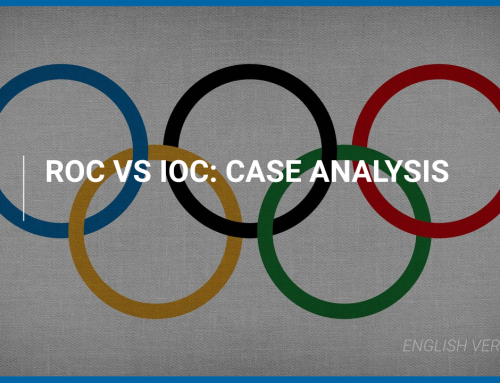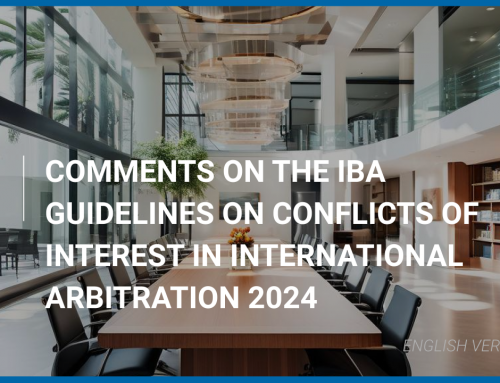Published and translated by the firm Winter – Dávila & Associés
Paris, 1 Juin 2023
The recent development of third party funding of litigation presents a number of opportunities for law firms, for the parties involved in a lawsuit and for financial institutions which find in this a new financial market. It also presents opportunities for justice in general, as it gives access to justice to parties without resources and to minorities, especially in the case of arbitration.
However, the introduction of a third party in the lawyer-client relationship is potentially a source of various problems and risks of different natures. They can be ethical, deontological, economic and public policy.
Third Party Funding, or Third Party Funding, “TPF” below, are contracts that allow a financial institution, usually an investment fund or a bank, to invest in a national judicial or arbitration process. The financier intervenes by paying all the costs of the case and the proceedings. Then, in the event of a successful outcome for the party with whom it has signed this TPF contract, the financier will receive the portion of the amount agreed in the contract. This usually ranges from 20 to 50%, and sometimes much more, up to 300%[1]. Otherwise, in case of failure, the third party is not entitled to claim any reimbursement. The remuneration of this third party depends on several factors.
TPF also manifests itself in different ways, for example, the fund can buy the right to sue and thus subrogate itself to the rights of a party, in this case it is a party to the proceedings. In other cases, it can buy an award or judgment and ensure its enforcement.
The financing of litigation by third parties has many advantages, especially in the context of arbitration.
Indeed, they have the first advantage of facilitating access to arbitration for parties who cannot afford to pay the fees of the proceedings and their lawyers.
The TPF is very attractive for financiers, given that current figures show an average of 5 years from investment to recovery, with a success rate of around 80%, according to the financiers[2],
The most criticisable aspects of the TPF are the problems of the risk of judicialisation of the company and the multiplication of lawsuits. There are also risks linked to conflicts of interest. Indeed, the interests of the financier may be opposed to those of the plaintiff. The financier has considerable power in the process, and if he leaves the party without financing, he can often not continue with the process since he would not even have been able to enter without financing.
The only regulations that exist today to protect the financed party are the more general regulations of the law of obligations and commercial law. They are not adapted to the subject matter and the interests at stake. There are also soft law rules, but there are currently no regulations that are commensurate with the public interests to be protected.
Today, the rules of arbitration institutions are the most developed elements of TPF regulation.
Indeed, as we have already introduced, the vast majority of TPF-funded disputes are arbitration proceedings. Moreover, the vast majority of arbitration proceedings take place in arbitration institutions.
The rules regulate the TPF to avoid conflicts of interest. The duty of the institutions and their primary reason for existence is that the award to be published can be enforced and in no case annulled.
These regulations tend to make the contract or the financial institution public in order to be aware of possible conflicts of interest.
YOU CAN ALSO READ:Introduction to ICC Arbitration
They do so as follows:
The IBA, International Bar Association[3], has been the first organisation to address the issue of conflicts of interest linked to PFT. It highlights in the 2014 IBA Guidelines on Conflicts of Interest in International Arbitration that funders have a direct economic interest in the process and the award to come. “Third-party funders and insurers in relation to the dispute may have a direct economic interest in the award, and may therefore be regarded as equivalent to the party.”
The International Chamber of Commerce (ICC) is the world’s leading arbitration institution. It has published new rules to govern the arbitration proceedings it conducts in 2021. We are particularly interested in the new article 11.7[4] of the Rules. This article expressly obliges the parties to disclose any agreement entered into with a financial institution in the framework of the proceedings in order to finance them. This rule allows for the control and avoidance of potential conflicts of interest. For example, an arbitrator who has a conflict with the financier would have to disclose it and resign. Depending on the type of conflict, the parties may also be able to exercise their right of challenge.
ICSID, the International Centre for Settlement of Investment Disputes, also regulates in its Rules the presence of a third party financier in disputes hosted by the centre, in rule 12 of its Rules of Procedure[5].
In Spain, the Code of Good Practice of the Arbitration Club also relies in its sixth section[6] on the duty to disclose the existence of the financing party, its identity and the time at which the financing agreement takes place. The text goes even further by allowing arbitrators to request from the party any additional information that is relevant to consider any risk of conflict. To safeguard the more private aspects of the financing agreement, such as the financial terms, for example, the party may redact confidential data.

The Madrid International Arbitration Centre (CIAM) also includes relevant TPF provisions, Article 23 of its Arbitration Rules[7] includes the duty of the parties to inform the tribunal of the existence of third party funding, their identity and also grants the arbitral tribunal the power to request further relevant information. A very similar provision is typified in Article 55 of the Rules of the Madrid Court of Arbitration.
It is interesting to highlight the role of these rules and their importance since the vast majority of arbitrations take place within institutions (approximately 86% of the proceedings) and under the rules of the institution hosting the proceedings.
Soft law is very powerful in the field of arbitration. Alexis Mourre, former president of the International Chamber of Commerce, defined soft law at the Hugo Grotius Arbitration Conference as a condition for the development of confidence in arbitration. 9] According to the author, these rules are very important as they represent an element of diffusion and simplification of international law.
The institutions of the European Union also want to regulate the matter and have recently started with the European Parliament resolution 2020/2130(INL)[10].
The aim is to create a regulation that can both protect the interests of weaker parties and avoid problems of conflicts of interest.
First of all, the recitals of the text mention the very positive aspects of the practice, especially in terms of access to justice for weaker parties. In view of the different recitals, it is worth mentioning that the European Institution supports the practice and recognises its advantages as much as it recognises to some extent its necessity in order to reduce the considerable imbalances that still exist in access to justice, especially for weaker parties and minorities. It also discusses the benefits of the TPF in the case of class and joined actions.
The following recitals list the negative aspects of the practice, e.g. the fact that the funder can influence and control the process, even if it is against the will of the funded party, the very high or excessive returns for the funder. It also deals with the growth of the practice on European territory and the legal vacuum surrounding the practice.
The parliament, in its recitals, insists on the importance of regulation, since, without regulation, the practice of MFT could present “substantial risks to the administration of justice[11]”. The Parliament recognises that the current vacuum favours the risk “that litigation funders act with a lack of transparency”. Finally, it insists on the principle of unification of law in the European Union, and the Parliament presents these resolutions also in order to ensure a balance in the regulation of practice throughout the Union, avoiding the risk of fragmentation and, we understand, the Shopping Forum within the Union.
The objectives of the resolution are the establishment of minimum standards for the regulation of the TPF, the protection of the weakest parties in this type of contract, which are the financed. It also aims to regulate the remuneration of financial institutions as well as conflicts of interest and abusive processes.
YOU CAN ALSO READ: What is an arbitration award?
The proposed means of regulation:
a) Putting in place a system of authorisation of funders.
It is recommended that a system of supervisory authorities be developed which could grant and maintain or not the necessary authorisations to operate. Such a system already exists for other financial activities such as financial markets and credit institutions, for example.
b) On ethical aspects
The resolution recommends an obligation to respect the fiduciary duty of care which requires them to act in the interest of the claimant. This duty would oblige them to always act in the interest of the financed and would prevent them from abusively controlling the process. Thus, a strict separation is proposed, those who have the real power over the process must be the party involved and its representatives and not the financier.
It also seeks to avoid conflicts of interest, and in this matter, the resolution proposes the solution already adopted by many arbitration rules, the possibility of requiring the disclosure of certain elements of the financing contract. It proposes the “obligation for claimants and their lawyers to disclose funding agreements to the courts on their own initiative or upon request by the defendant, and to inform the court of the existence of commercial funding and the identity of the funder in the specific case; it considers that the court should inform the defendant of the existence of third-party litigation funding and the identity of the funder”.
Another ethical aspect in favour of the financed party is the proposal that it should be impossible, except in exceptional cases, for the financial institution to abandon the financed party in the middle of the proceedings.
c) On the limitation of the remuneration of the financier
The Parliament proposes in this section to establish a limitation of the remuneration proportional to the amount agreed in the judgement or award. It proposes, subject to exceptions, that a minimum of 60% of the amount be compulsorily allocated to the financed claimant.
All in all, this is an important first step on the road to regulating the TPF and protecting fundamental principles that are currently at risk.
LEGAL NOTICE: This article has been prepared for informational purposes only. It is not a substitute for legal advice directed to particular circumstances. You should not take or refrain from taking any legal action based on the information contained without first seeking professional, individualized advice based on your own circumstances. The hiring of a lawyer is an important decision that should not be based solely on advertisements.
References
[1] Estudio del EPRS (2021): Responsible private funding of litigation (Financiación privada responsable de las costas procesales). Anexo relativo al panorama actual de la financiación privada de litigios en la Unión y la normativa vigente aplicable en la materia.
[2] Información sacada de las páginas internet de estos dos fundos. Deminor y Profile Investment https://drs.deminor.com/fr/ / https://profileinvestment.com/expertise/
[3] Directrices IBA sobre Conflictos de Intereses en Arbitraje Internacional 2014 Nota explicativa sobre la Norma General 6:
[4] ICC Rules of Arbitration entered into force on 1 January 2021, article 11.7 “In order to assist prospective arbitrators and arbitrators in complying with their duties under Articles 11(2) and 11(3), each party must promptly inform the Secretariat, the arbitral tribunal and the other parties, of the existence and identity of any non-party which has entered into an arrangement for the funding of claims or defences and under which it has an economic interest in the outcome of the arbitration.”
[5] ICSID Amended 2022 Rules « A party shall file a written notice disclosing the name and address of any non-party from which the party, directly or indirectly, has received funds for the conciliation through a donation or grant, or in return for remuneration dependent on the outcome of the conciliation (“third-party funding”). If the non-party providing funding is a juridical person, the notice shall include the names of the persons and entities that own and control that juridical person. »
[6] VI. SECCIÓN SEXTA: DEBERES RELATIVOS A LA FINANCIACIÓN 1. OBLIGACIÓN DE REVELACIÓN
[7] CIAM Reglamento de Arbitraje; en vigor desde el 1 de enero de 2020
[8] STSJ Madrid (Secc. 1a) 23 octubre 2020 (ROJ STSJ M 12155/2020)
[9] Alexis Mourre, La Soft law como condición para el desarrollo de la confianza en el arbitraje internacional, Madrid 25 de mayo de 2017, CEU Ediciones.
[10] European Parliament resolution of 13 September 2022 with recommendations to the Commission on Responsible private funding of litigation (2020/2130(INL))
[11] Considerando J “whereas the number of litigation funders is hard to determine, with at least 45 such funders known to operate in the Union; whereas, although in most Member States, the practice of TPLF has so far been limited in its extent, it is expected to play a growing role in the coming years, but it remains largely unregulated in the Union, despite the fact that it could present not only benefits, but also material risks to the administration of justice that need to be addressed;”
If you want advice related to the subject of the
article do not hesitate to contact us!
(email: contact@wdassocies.com)










Leave A Comment